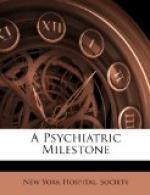By creating for this Hospital a liberal foundation, by completing its equipment so as to make possible a free exchange of patients and of workers from the Hospital in the city and this place in the country, much has been done and more will be done to set a living example of the very spirit of modern psychopathology and psychiatry. We know now that from 10 to 40 per cent of the patients of the gynecologist, the gastroenterologist, and the internist generally would be better treated if a study of the life problems were added to that of the special organs and functions. To meet this need it should be possible to have enough workers in this branch of the Hospital to take their share of the consulting and co-operation work in the wards and dispensary of the General Hospital, and perhaps even in the schools provided for the same type of people from which you draw your patients. The grouping of the patients can be such that the old prejudices need not reach far into the second century of the life of the Hospital. With a man of the vision and practical experience of Dr. Russell, there is no need for an outsider to conjure up a picture of special practical achievements as I have done of the more general principles to-day.
An institution is more than a human life. Many ambitions combine and become part of a group spirit permeating the organization and reaching their fulfilment in the succession of leaders. The life and growth and happy self-realization of an institution is not the bricks and mortar—it is a living and elastic entity—never too stable, never too finished, a growing and plastic plant—to use a metaphor that has slipped in perhaps without arousing all the implications the term plant might carry and does carry.
Some years ago my wife celebrated her birthday and told her colored cook jocosely: “Geneva, I am a hundred years old to-day.” The cook’s jaw dropped and then she suddenly remarked: “Lord! you don’t look dat ole.” That is the way I feel about Bloomingdale Hospital as we see it to-day pulsating with ever-fresh life and ever-fresh problems! How different from a simple human being, after all! The heart and wisdom of many a man and woman has gone into the perpetuation of what a few thoughtful men started in 1821 and the result is that it is ever renewing its youth.
Many a dream has been realized and many a dream has given way to another. Here and there the past may make itself felt too much. But the spirit and its growth show in recruiting ever-new lives to meet the present day and the days to come, and this all the more so if we can show the younger generation that every effort is likely to have its reasonable direct support. We all want a man like Dr. William L. Russell to have the fullest opportunity to bring to its best expression the rich and well-tried wisdom of over twenty-five years of devoted work in the field. This is no doubt a time of stress when many personal and general sacrifices may be needed to bring about




